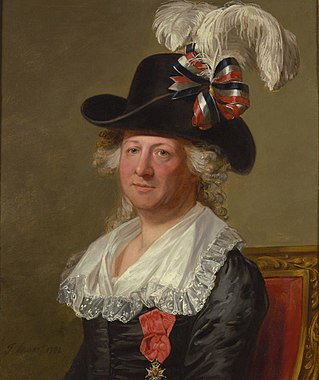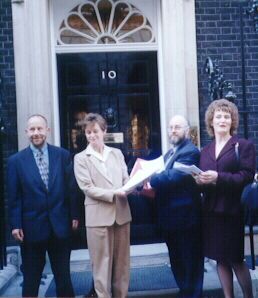Related Research Articles
Transvestism is the practice of dressing in a manner traditionally or stereotypically associated with a different gender.

Charles d'Éon de Beaumont or Charlotte d'Éon de Beaumont, usually known as the Chevalier d'Éon or the Chevalière d'Éon, was a French diplomat, spy, and soldier. D'Éon fought in the Seven Years' War, and spied for France while in Russia and England. D'Éon had androgynous physical characteristics and natural abilities as a mimic and a spy. D'Éon appeared publicly as a man and pursued masculine occupations for 49 years, although during that time, d'Éon successfully infiltrated the court of Empress Elizabeth of Russia by presenting as a woman. Starting in 1777, d'Éon lived as a woman and was officially recognized as a woman by King Louis XVI.

Stephen Thomas Whittle, is a British legal scholar and activist with the transgender activist group Press for Change. Since 2007, he has been Professor of Equalities Law in the School of Law at Manchester Metropolitan University. Between 2007 and 2009, he was president of the World Professional Association for Transgender Health (WPATH). Having been assigned female at birth, he is described as "a radical lesbian before his sex change and now a leading commentator on gender issues", who after the Gender Recognition Act 2004 came into force in April 2005, achieved legal recognition as a man and so was able to marry his female partner.
Tri-Ess is an international educational, social, and support group for heterosexual cross-dressers, their partners, and their families.
The Sex Orientation Scale (SOS) was Harry Benjamin's attempt to classify and understand various forms and subtypes of transvestism and transsexualism in biological males, published in 1966. It was a seven-point scale ; it was analogous to the Kinsey Scale as it relates to sexual orientation, which also had seven categories.
Fantasia Fair is a week-long conference for cross-dressers, transgender and gender questioning people held every October in Provincetown, Massachusetts, a small Portuguese fishing village and largely gay and lesbian tourist village on the very tip of Cape Cod. This annual event is the longest-running transgender conference in the United States and it provides a week for attendees to experiment with gender-role identities and presentations in a safe and affirming community. The goal of the conference is to create a safe space in which crossdressers, transgender and transsexual people, and nonbinary-gendered people are accepted without judgement, can interact with their peers, and can advocate for their rights. In November, 1980 the event was featured in an article by D. Keith Mano in Playboy magazine and has in ensuing years has continued to generate publicity.

Christine Burns is a British political activist best known for her work with Press for Change and, more recently, as an internationally recognised health adviser. Burns was awarded an MBE in 2005 in recognition of her work representing transgender people. In 2011, she ranked 35th on the Independent on Sunday's annual Pink List of influential lesbian, gay, bisexual, and transgender people in the United Kingdom.
The Southern Comfort Conference is a major transgender conference that has taken place annually since 1991. It features seminars, events, and speeches by prominent people in the LGBT community, numerous vendors catering to transgender and transsexual people, and more. The event has become famous and today is known as the largest transgender conference in the United States. The event brings together transgender people, researchers, educators, therapists, doctors, and LGBT organizations fand offers scholarships to some attendees.

A transgender person is someone whose gender identity differs from that typically associated with the sex they were assigned at birth. Some transgender people who desire medical assistance to transition from one sex to another identify as transsexual. Transgender is also an umbrella term; in addition to including people whose gender identity is the opposite of their assigned sex, it may also include people who are non-binary or genderqueer. Other definitions of transgender also include people who belong to a third gender, or else conceptualize transgender people as a third gender. The term may also include cross-dressers or drag kings and drag queens in some contexts. The term transgender does not have a universally accepted definition, including among researchers.

Louis Graydon Sullivan was an American author and activist known for his work on behalf of trans men. He was perhaps the first transgender man to publicly identify as gay, and is largely responsible for the modern understanding of sexual orientation and gender identity as distinct, unrelated concepts.

A transsexual person is someone who experiences a gender identity that is inconsistent with their assigned sex, and desires to permanently transition to the sex or gender with which they identify, usually seeking medical assistance to help them align their body with their identified sex or gender.

Press for Change (PFC) is a UK-based campaign group focusing on the rights and treatment of trans people. Its stated aim is "seeking respect and equality for all trans people in the UK". The group led the campaign for full legal recognition for transgender people living in Britain including the right to marry. The organisation began on 27 February 1992 and its founders included Mark Rees and Stephen Whittle.

Roberta Perkins was an Australian sociologist, writer, and transgender rights and sex worker rights activist. She wrote several books and multiple academic articles on the semi-nomadic lives of transgender sex workers, and established the first assistance center for transgender people in Australia.

This article addresses the history of transgender people across the British Isles in the United Kingdom, the British colonies and the Kingdom of England until the present day. Transgender people were historically recognised in the UK by varying titles and cultural gender indicators, such as dress. People dressing and living differently from their sex assignment at birth and contributing to various aspects of British history and culture have been documented from the 14th century to the present day. In the 20th century, advances in medicine, social and biological sciences and transgender activism have influenced transgender life in the UK.

The Transsexual Phenomenon is a medical textbook published by American endocrinologist and sexologist Harry Benjamin in 1966 with The Julian Press. The text is notable for its examination of transsexualism not as a psychological issue, but rather as a somatic disorder that should be treated through medicine. Benjamin argues that transvestism and transsexuality are a spectrum of conditions, requiring different treatments that ranged from hormone replacement therapy to surgical intervention.
Louise Lawrence (1912–1976) was an American transgender activist, artist, writer and lecturer. During the mid-20th century, she organized a network of gender non-conforming people across the US and abroad, and advocated for transgender issues. She was an early founder of the magazine, Transvestia. Academic and historian Susan Stryker wrote, "If there is an unheralded founder of the transgender community in the United States, it’s Louise Lawrence.".
Transvestism and Transsexualism in Modern Society, also known as The First National TV.TS Conference, was a conference held in Leeds, England, from 15 to 17 March 1974. It was the first such event to be organised by members of the community. With an educational remit, the conference sought to further understanding of issues faced by transvestites and trans women.
Carol S. Riddell is a British feminist and socialist sociologist and transgender lesbian who was active in the UK Women's liberation movement in the 1970s. She is known for authoring Divided Sisterhood, the first feminist critique of Janice Raymond's book The Transsexual Empire.
Della Aleksander was a teacher and campaigner for trans rights. She was a co-producer of an episode of the current affairs programme Open Door, which was the first to feature trans women. She was a member of fascist organisations, such as the League of St George.
Full Personality Expression (FPE), also Phi Pi Epsilon, was formed in 1962 by Virginia Prince as an organization for heterosexual male crossdressers, based on her earlier Hose & Heels Club. The Alpha chapter was located in California, but new chapters appeared across the United States and Europe. Prince received some criticism for restricting the group's membership to heterosexual (and mostly married) crossdressers and policing of sexual content.
References
- 1 2 "Beaumont Society Press Cuttings Collection". Bishopsgate Institute. Retrieved 2024-03-13.
- ↑ Playdon, Zoë (2021-11-02). The Hidden Case of Ewan Forbes: And the Unwritten History of the Trans Experience. Simon and Schuster. p. 225. ISBN 978-1-9821-3946-9.
- 1 2 Phillips, Sara (2021-03-24). "Friends of Eon, 1978" . Retrieved 2024-03-19.
- 1 2 3 4 5 6 7 8 9 "Museum of London | Free museum in London". collections.museumoflondon.org.uk. Retrieved 2024-03-13.
- ↑ Ekins, Richard; King, Dave (2006-02-07). Virginia Prince: Pioneer of Transgendering. CRC Press. p. 8. ISBN 978-0-7890-3055-9.
- 1 2 3 4 5 6 Pickett, Brent (2024-02-26). The Transgender Encyclopedia. Rowman & Littlefield. p. 39. ISBN 978-1-5381-5726-8.
- ↑ Thane, Pat (2010-04-19). Unequal Britain: Equalities in Britain Since 1945. A&C Black. p. 147. ISBN 978-1-84706-298-7.
- 1 2 Whittle, Stephen (2012-08-21). Respect and Equality: Transsexual and Transgender Rights. Routledge. ISBN 978-1-135-33706-3.
- ↑ "Beaumont Society". www.consortium.lgbt. Retrieved 2024-03-13.
- ↑ "Overview - Beaumont Society - NHS". www.nhs.uk. Retrieved 2024-03-13.
- ↑ "'We are a voice, we are a friend'". Kent Online. 2019-09-09. Retrieved 2024-03-13.
- ↑ Wardle, Faye Helen (2013-04-03). You Should Have Seen the Caterpillar. Xlibris Corporation. p. 136. ISBN 978-1-4836-1796-1.
- 1 2 "Trans Pioneers – Trans and Gender-Nonconforming Histories | Historic England". historicengland.org.uk. Retrieved 2024-03-13.
- ↑ "GENDYS Journal - The First UK Transgender Conferences, 1974 and 1975". 2023-05-12. Archived from the original on 2023-05-12. Retrieved 2024-03-16.
- ↑ Medical news. J R Coll Gen Pract. 1975 Mar;25(152):206–7. PMCID: PMC2157633.
- ↑ Burns, Ms Christine (2018-01-25). Trans Britain: Our Journey from the Shadows. Unbound Publishing. ISBN 978-1-78352-470-9.
- ↑ Ekins, Richard. "A Concise History of the University of Ulster, Trans-Gender Archive (1986-2010)." (2013).
- ↑ Fawcus, Margaret (2013-11-11). Voice Disorders and their Management. Springer. p. 323. ISBN 978-1-4899-2861-0.